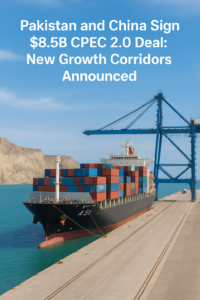
Pakistan and China Sign $8.5B CPEC 2.0 Deal: New Growth Corridors Announced
Introduction
In a major development, Pakistan and China have signed investment agreements worth $8.5 billion, launching the second phase of the China-Pakistan Economic Corridor (CPEC 2.0). The new deal focuses on fast-tracking infrastructure projects, strengthening regional connectivity, and expanding cooperation across multiple sectors.
Five New Corridors
The CPEC 2.0 framework introduces five new economic corridors:
-
ML-1 Railway Upgrade: Enhancing freight and passenger speed.
-
Karakoram Highway Realignment: Strengthening northern connectivity.
-
Gwadar Port Expansion: Turning Gwadar into a major trade hub.
-
Digital Corridor: Promoting IT and e-commerce.
-
Green Energy Corridor: Boosting renewable power generation.
Multi-Sector Investments
Agreements cover diverse areas including:
-
Agriculture modernization for higher exports.
-
Renewable energy projects to ensure sustainability.
-
Electric Vehicles (EVs) development in Pakistan.
-
Steel and healthcare industries to strengthen the economy.
Bureaucratic & Security Reforms
To ensure smooth implementation, Pakistan has pledged:
-
Quick approvals and reduced red tape.
-
Enhanced security for Chinese personnel working on projects.
Prime Minister Shehbaz Sharif assured investors that there would be “not a second’s delay” in providing facilitation.
Strategic Outlook
The Joint Action Plan 2024–2029 will guide CPEC 2.0, focusing on industrial cooperation, technology transfer, and regional trade. Analysts view the agreement as a game-changer for Pakistan’s economy and a fresh start for bilateral ties.